Kutuzov VS Kutuzov: the courtier against the commander
It has arrived - who helped us here?
Frenzy of the people
Barclay, winter or Russian god?
A.S. Pushkin "Eugene Onegin"
O people! pathetic race worthy of tears and laughter!
Priests of the minute, fans of success!
How often does a person pass by you
Over whom the blind and turbulent age curses
But whose high face in the coming generation
Poet will delight and emotion!
A.S. Pushkin "Commander"
Every person is first of all a person, and only then a collegiate registrar, a field marshal, a sovereign-emperor and the first secretary ... It happens that a person helps an official, and sometimes it interferes. Here is A.S. Pushkin ... The great poet, but ... what about him was written down in the papers of the police department in St. Petersburg? "Famous cashier" - that is, a gambler! And did Pushkin's addiction to the card game prevent Pushkin, the poet, from interfering? Probably even helped in something: he forced me to write, write and write, and we all benefited from it! Although his family, of course, looked at it differently. But did Kutuzov Kutuzov, the commander, help?
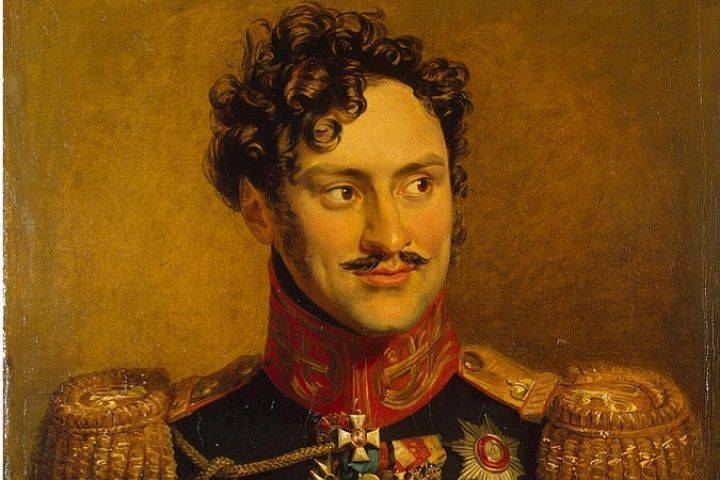
A.I. Chernyshev - Russian James Bond of the 19th century.
Not so long ago, IN published Alexander Samsonov’s article “With a general like Kutuzov, Russia can be calm,” in which he views him as a commander, paying minimal attention to everything else. But ... the commander is inseparable from the person, as well as from his environment, so it makes sense to look at other aspects of the life course of this person who really played in stories Russia has a very significant role.
Well, it’s best to start, I think, from the way Kutuzov established himself in a person like Suvorov. Samsonov writes about this in sufficient detail, and there is no point in repeating, except for one Suvorov phrase: “Heather, artful!” That is, this quality caught his eye, but you can use it and not in battle! Carefully studying his biography, it is easy to notice that Kutuzov understood quite early that a career can be made not only on the battlefields, but also on the parquet floor of the Winter Palace, or, more correctly, in the reception room of the Empress's favorite! “And what would be the orders to get, there are different channels. I judge them as a true philosopher, ”wrote Griboedov, and this can also be attributed to Kutuzov, especially in comparison with Suvorov. And it was not for nothing that, in 1822, the same Pushkin, in his Notes on Russian History of the 18th Century, wrote: “We saw how Catherine humiliated the spirit of the nobility. In this case, her pets were zealously helping. It is worth recalling ... about the monkey Count Zubov, about the coffee pot of Prince Kutuzov, and so on. and so on. ”(Pushkin A.S. Complete Works in Six Volumes. T.6. M., 1950. C.9.). And what kind of coffee pot? Yes, he brewed coffee to him and said that he had learned to cook it well from the Turks. A military general and suddenly brewed coffee to the temporary worker? It is clear that the time was so, but still ... Suvorov did not do it like that. “In the 1795 year,” A. Samsonov tells us, “the empress appointed Kutuzov commander-in-chief ... and at the same time director of the Land Cadet Corps. Mikhail Illarionovich entered the narrow circle of persons who made up the Empress’s elected society. Kutuzov did much to improve the training of officers: he taught tactics, military history and other disciplines. Yes, I taught! But the Cadet did not use love! In the same year, 1795, the cadets, who knew about his services to a despised favorite, shouted to their director when he got into the carriage to go to the omnipotent temporary worker: “Scoundrel, Zubov’s tail!” (Glinka SN Notes. St. Petersburg, 1895. S.122.) And he received the post of director of the corps not just “for merits”, but by the protection of Zubov, and even profited from selling land in the capital that belonged to this corps!
Emperor Pavel I. Portrait by V. Borovikovsky.
This ugly story of abuse of his official position surfaced in the light of day already under Emperor Paul I, but under the patronage of Grand Duke Konstantin Pavlovich was hushed up. (“Notes of Count EF Komarovsky. M., 1990. C. 44.) And it is clear that such Exercises have dropped Kutuzov not only in the opinion of him of his cadets, but also of all those who were brought up in the new century , and in fact such people surrounded the young Grand Duke Alexander, who himself adhered to the same convictions.
“Emperor Alexander Kutuzov did not like,” writes A. Samsonov. - But Alexander was always careful, did not make any sudden movements. Therefore, Kutuzov did not immediately fall into disgrace. With the accession of Alexander I, Kutuzov was appointed by the Petersburg and Vyborg military governors, as well as by the civil affairs manager in the said provinces and by the inspector of the Finnish Inspectorate. However, already in 1802, feeling the coldness of the emperor, Kutuzov referred to ill health and was removed from his post. ”
In fact, it was not so at all, but as is well known. Let's start with the fact that he did not go on an expedition to Italy in 1799 with Suvorov, but, nevertheless, already in September 1800 received the Order of Saint Apostle Andrew the First-Called from Paul hands for ... his maneuvers. Suvorov himself received this order for winning the Kinburn Spit, in which he was wounded twice.
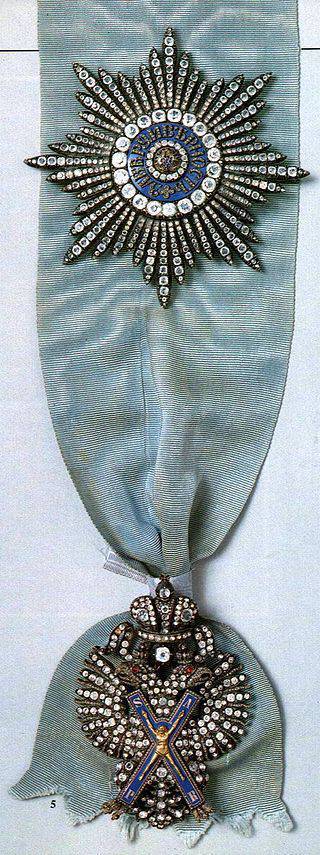
Star and badge of the Order of St. Andrew the First Called with diamonds. From the collection of the State Historical Museum.
And such rewarding hardly improved the opinion of now Tsarevich Alexander about Kutuzov. He was present at the last evening at Paul 11 March 1801 of the year. But he knew about the plans of the conspirators or did not know? It seems that he was not informed. But ... was it possible that such a cunning and “sensitive” person, being in the circle of the military, including the same Bennigsen, who went down in history with his phrase: “The nest is warm, the bird is not far”, could not help but feel the danger to his adored monarch? Could But did not take any steps. Sometimes it is also very profitable to be blind and deaf.
Snuffbox, which according to legend was killed by Paul the First.
And yes, then Alexander appointed Kutuzov to all the above high posts. But how did he show himself to them? Amazingly slow administrator!
So in the spring of 1802, St. Petersburg was shocked by the scandalous death of the famous beauty Mrs. Araujo, who rejected the love claims of Grand Duke Constantine, who was raped by his adjutants so that she died. The shocked spouse of the crown prince went to Germany. Well, the emperor ordered the governor Kutuzov to investigate this crime. And not just to investigate, but so that all "the perpetrators were discovered, despite the persons, ranks and their place." (Volkonsky SG. Notes. Irkutsk, 1991. C. 101.) However, there was nothing open, the criminals did not incur punishment. Further more: the story of a conspiracy in favor of the same Grand Duke Constantine was born with the aim of overthrowing Emperor Alexander, and enthroning Constantine. The history made a lot of noise, reflected in the international prestige of Russia, but Kutuzov again did not discover anyone or anything. (Foreign policy of Russia in the XIX-early XX centuries. Collection of documents. T.1. M., 1960. C.234, 236.) And here it is no longer a question of the emperor’s “coldness”, but of dismissal “For loss of confidence” or even about the incompatibility of the position held. But it’s understandable, but how could he at least accuse Konstantin, who helped him, saved him from revelations when he was director of the cadet corps? “How will you begin to represent the cross to the place ...” So he returned his “duty” to him, but in the opinion of the emperor he fell very much. And then the time of Austerlitz came ...
We read A. Samsonov further: "Contrary to the will of Kutuzov, who warned the emperors from the battle and offered to withdraw the army to the Russian border ... The battle ended in a severe defeat for the Allied army."
It is clear that the young emperor wanted to try himself on the battlefield. And it is clear that he listened to the flattering speeches of those who advised him to do so. And then it was like this: “Our commander-in-chief of human charitable behavior agreed to carry out other people's thoughts, which he did not approve of in his heart” (MA Fonvizin Works and letters. 2. Irkutsk, 1982. C.153.). However, could he act differently, knowing well his reputation in the eyes of his sovereign? But he came at night to the chief of the Grand Marshal Tolstoy and asked him to dissuade the emperor from the battle! He replied that his duty was fowls and wine, but the generals must fight! (Count Joseph de Mestr. Petersburg Letters. SPb., 1995. S.63.) But what such an outstanding military authority of the nineteenth century, as G.A. Leer: “Kutuzov can be blamed not for the lack of art for Austerlitz (which is even better confirmed by his actions in 1811 in Turkey (Ruschuk), and in 1812) and not in the lack of fighting courage, proved by his personal participation in the battle and the resulting injury , but under Austerlitz he lacked civil courage to tell the whole truth to the young emperor so that he could warn one of the greatest calamities for the Fatherland (which explains the cooling of the sovereign to Kutuzov, which lasted until 1812). Such is the personal fault, the great Kutuzov wine. In all other respects, the false position was blamed, which turned him into the commander-in-chief of the powerless and powerless ”(Leer, GA Detailed outline of the 1805 war of the year. Austerlitz operation. SPb., 1888. С.57-58.)
“However, behind the scenes, others were blamed on Kutuzov. Alexander believed that Kutuzov deliberately set him up. " And was he really wrong? Only unconsciously! Just Kutuzov nobleman defeated commander Kutuzov, that's all! He was a good student of the great Suvorov in military affairs, but he did not learn the main lesson, and this was a lesson in citizenship. He was never as blameless as Suvorov, and therefore could not bravely defend his opinion in the face of the sovereign, even though he was right a hundred times, because he understood that the sovereign did not trust him and knew WHY he did not trust him. And the worst thing is that Kutuzov could not say anything to himself in excuse!
Further, it can be said that in the 1812 year, without being embarrassed by the presence of the emperor, he overcame the talents of the court in himself and saved both the army and the Fatherland, insisting on his right to do what he did. Only here, everything turns out, not everything is so simple!
And it was so that, having a great military and military leadership experience, Barclay de Tolly, being in 1810, as Minister of War, did what? Organization of the Secret Expedition, that is, organized a service of foreign intelligence. He reported to the emperor about her goals and objectives, and he approved his idea. As a result, Alexander Ivanovich Chernyshev, Grigory Fedorovich Orlov and Pavel Ivanovich Brozin went abroad, who began to transfer valuable information to Russia from Paris, Berlin and Madrid. And Chernyshev in Paris put himself at all in such a way that he became known as a ladies' man and a womanizer and ... a non-dangerous person who willingly lent money to trusting card players. Remember the lieutenant Rzhevsky and the cornet Azarov (Shurochka Azarova) from the movie “The Hussar Ballad”: “You punt? But no! That is ... yes! Then you will understand without difficulty! I lost a shot, even a bullet in the head! ”So he acted as well, as a result of which copies of the most secret documents of Napoleon himself lay on the table!
True, he made one mistake, which cost him the information channel - his informant was guillotined, and there was no one to supply information, but Chernyshev himself happily escaped. But the information came from other places, as there were enough agents for Russian gold even in abundance. And the messages were written in invisible ink! At that time they were already known! The processing of incoming data was handled by a well-known military writer, Lieutenant Colonel Pyotr Andreyevich Chuykevich, and he also wrote a report in which he suggested to Barclay de Tolly to avoid a general battle with Napoleon, to conduct a partisan war and “not to be afraid of retreating into the country,” for the integrity of the state consists in integrity his armies. " (A written copy is kept in RGVIA F. 494. Op. 1. Unit. Xnumx. L. 14 - 1).
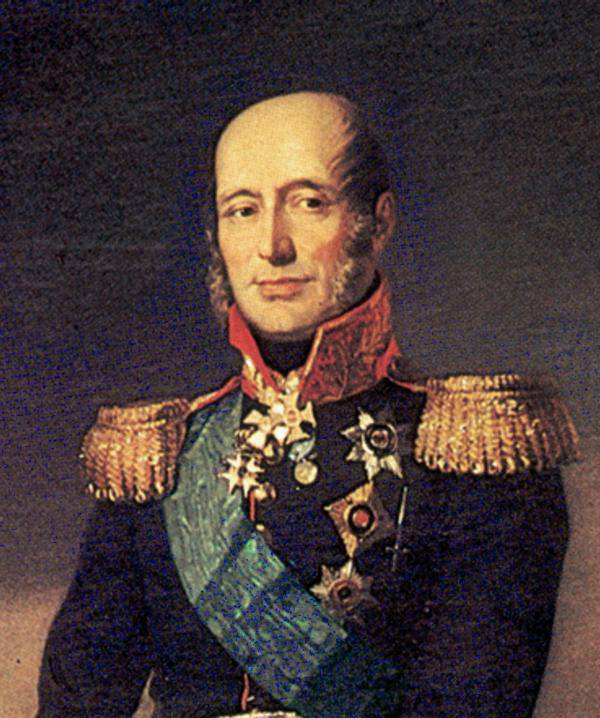
Barclay de Tolly. Portrait brush by J. Doe.
As a minister of war, all intelligence data, including Chuykevich’s report, Barclay de Tolly, of course, conveyed to Emperor Alexander. And he was already much more experienced in military affairs than at Austerlitz and this plan was approved completely! And although he donated to the public opinion “foreigner” Barclay, he did not refuse the plan itself! So, Kutuzov, once in the army, was only strictly following the plan that had been previously thought out and approved by the sovereign, the presence of which was not reported to officers of lower level of awareness, which was clearly shown by the council in Fili.
That is, everything happened, in general, the way it happened with Hitler. An analysis of Germany’s economic opportunities during the war on two fronts shows that he suffered a defeat ... in September 1939, when he began to fight at all, because he simply could not defeat either the Anglo-Saxons or Soviet Russia, no matter what victory he won. And the same was with Napoleon, although, of course, it is usually more pleasant for us to think that victories in war are gained on the battlefield by the heroism of soldiers and officers, and not on silk and scented sheets in the beds of the courtesans and sisters of emperors, but also in dirty ones, smoked shops and coal mines.
As for the battle of Borodino itself, here again Kutuzov showed himself not at all as a student of Suvorov, but only as a consistent executor of the royal will. He was told to take care of the army, so he and her coast! Having a quantitative advantage in artillery (albeit small!) And qualitative (in caliber) and knowing that Napoleon crushes the enemy with large, often stop-gun batteries, he reserved 305 guns in the village of Psarevo, in order to save them. And it turned out that Napoleon everywhere in the directions of his strikes against the Russian troops had a complete advantage over them in artillery. Shooting over the head of his troops, tested in wars with the Emperor Frederick, was not used, although ... he threw prickles (several thousand pounds!) On the flanks, which, in particular, deprived Poniatowski’s corps of the opportunity to enter the flank of the Russian army in the Old Smolensk road.
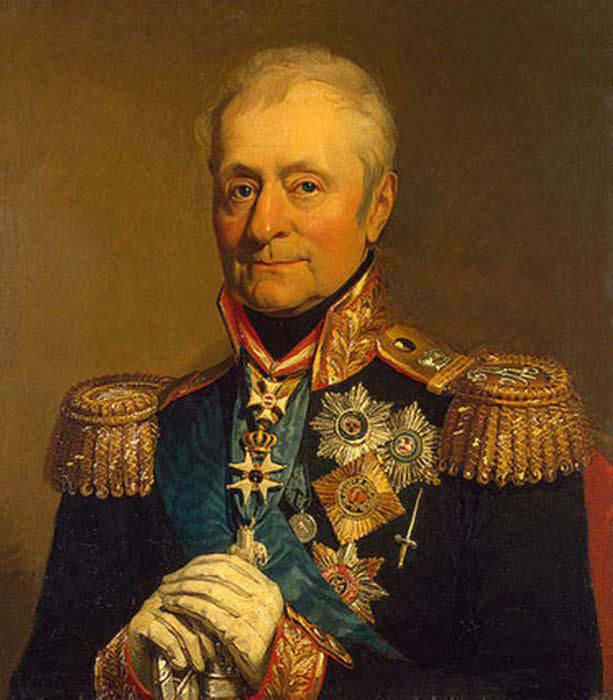
And this is the same LL. Bennigsen ...
Interestingly, the chief of staff to M.I. LL was appointed to Kutuzov Bennigsen is the first winner of Napoleon at Preuss-Eylau. After all, Napoleon himself said to Alexander at their meeting in Tilsit, "I declared myself the winner at Preuss-Eylau just because you wanted to retreat." And you can not even doubt how Kutuzov, the nobleman and commander in one person resented him because of this. And the king himself, probably thinking about himself: “Well, you took part in the murder of my father, now go, clear up all this mess with the same ...”
So in many respects the opinion of the national about M.I. Kutuzov is based on elementary ignorance and the political conjuncture of Soviet times, when it was not customary to say that the heroes of the Fatherland could also be mere mortals with all their weaknesses, so ... Well, in general, this was so - understandable!
So the figure M.I. Kutuzov in the memory of his descendants really remained legendary and "in many ways mysterious." Although the secrets would be much less if the same AI Chernyshev would leave behind a detailed memoir.
By the way, in the first edition of the poem "The Commander" A.S. Pushkin wrote the following lines:
There, an outdated leader! as a warrior young,
I was looking for you to die in the battle.
Here it is! Your successor has succeeded, hidden
In your head. - And you, unrecognized, forgotten
Hero of the occasion, rested - and in the hour of death
With contempt, perhaps, remembered us!
This caused the displeasure of Field Marshal MI's relative. Kutuzov Loggin Ivanovich Golenishchev-Kutuzov, who found in this the derogation of the merits of his ancestor. And he even printed in circulation in 3400 copies a special brochure with objections to Pushkin.
In response, Pushkin wrote a lengthy “Explanation”, the general meaning of which was reduced to a judgment: “Should we really be ungrateful to the merits of Barclay de Tolly, because Kutuzov is great?”
However, the poem in the end still changed ...
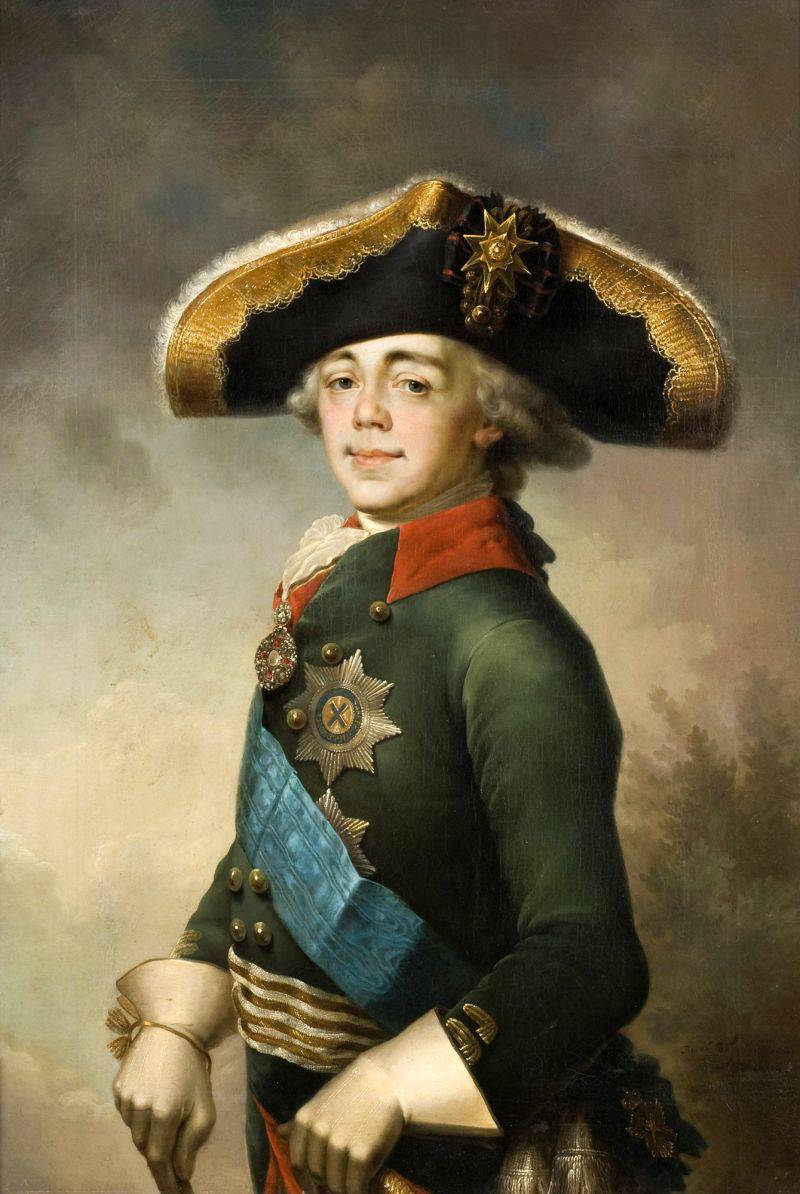
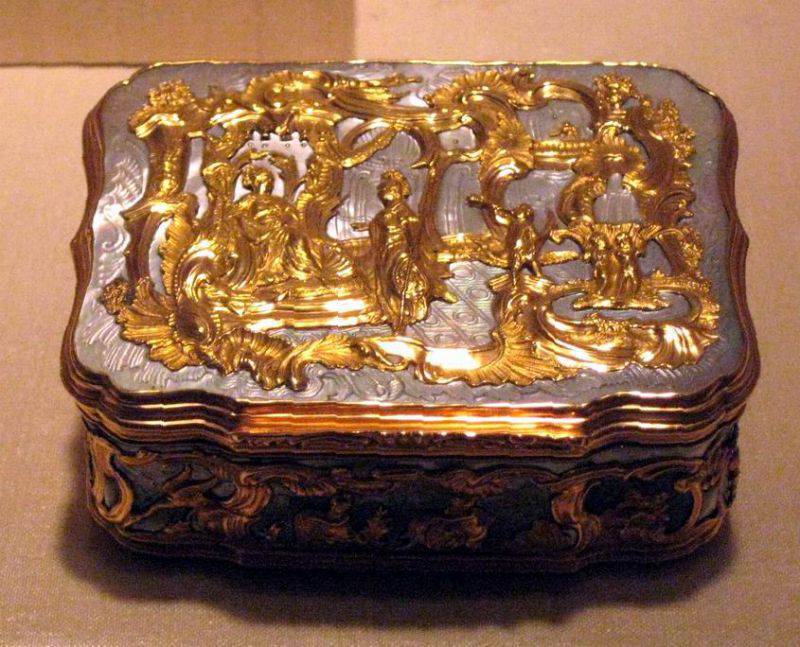
Information